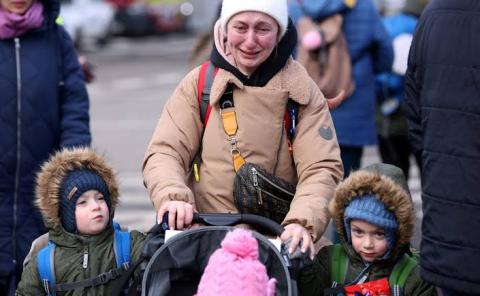
Russia's war has transformed everything in Kharkiv, including childhood.
Missiles are fired on Ukraine's second city from across the Russian border which is so close by that there are only seconds to stop them.
If they're aimed at Kharkiv there's every chance they'll hit - and little chance of reaching shelter.
School and kindergarten buildings have been closed for almost two years for safety, and playgrounds stand empty.
Now, as the full-scale war heads towards its third year, parts of life in Kharkiv are moving underground.
https://www.bbc.com/news/world-europe-68170396
Deep down in the metro, specially built classrooms run parallel to the platform at five stations.
The local authorities began offering school lessons beneath the city streets several months ago.
They've just added preschool classes on the weekends.
Nika's story
For six-year-old Nika Bondarenko, it's a chance to mix with other children again.
After two years studying online, she skips to her local metro station in bright pink wellies.
Her route passes the bombed-out ruins of military offices destroyed at the start of the invasion, opposite her home. There's more smashed glass and shrapnel-battered buildings all around.
The family walk to school past smashed glass and shrapnel-battered buildings
But once Nika is on the train, heading for class, her mother can stop worrying.
"Parents can be confident nothing's going to happen to their child and a child can continue their more-or-less normal life," Olha Bondarenko explains.
"The enemy can't get us here."
She says Nika has missed kindergarten, badly.
"It's so important. Otherwise, a child doesn't get to see any other kids, because there are none out on the streets and air raid sirens all the time."
Kharkiv now offers close to 700 kindergarten places underground, for children aged up to six. At least three times that number of children attend school classes in the same space.
Some have lost parents in the fighting, or lived in areas under heavy fire, and need extra support from the psychologists on hand alongside the teachers.
On the day we visit, there is music and movement and lots of laughter. One preschool group are dressed up as doctors and nurses; others are singing and building with plastic bricks.
Trying to be normal
The staff put everything into making things as normal as possible.
On the walls, beside brightly coloured pictures of flowers and giant caterpillars, there are posters about the danger of mines. But when the sirens go off warning of incoming missiles, no one needs to move.
The Bondarenko family fled town at the start of the war, as Russian troops were pushing to take Kharkiv and the shelling was constant.
Thousands of families were living in the metro then.
When the Russian forces were pushed back that September, the city began to breathe more easily again and Olha and her children came home.
No comments yet
Only members can post comments. Login or register to post comments.

 2
2 0
0